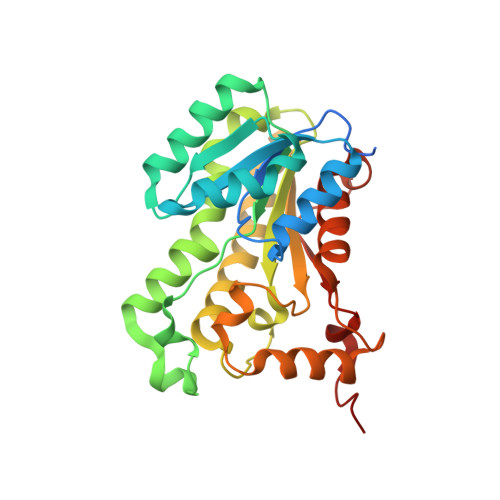Structural and biological evaluation of a novel series of benzimidazole inhibitors of Francisella tularensis enoyl-ACP reductase (FabI).
Mehboob, S., Song, J., Hevener, K.E., Su, P.C., Boci, T., Brubaker, L., Truong, L., Mistry, T., Deng, J., Cook, J.L., Santarsiero, B.D., Ghosh, A.K., Johnson, M.E.(2015) Bioorg Med Chem Lett 25: 1292-1296
- PubMed: 25677657
- DOI: https://doi.org/10.1016/j.bmcl.2015.01.048
- Primary Citation of Related Structures:
4J1N, 4J3F, 4J4T - PubMed Abstract:
Francisella tularensis, the causative agent of tularemia, presents a significant biological threat and is a Category A priority pathogen due to its potential for weaponization. The bacterial FASII pathway is a viable target for the development of novel antibacterial agents treating Gram-negative infections. Here we report the advancement of a promising series of benzimidazole FabI (enoyl-ACP reductase) inhibitors to a second-generation using a systematic, structure-guided lead optimization strategy, and the determination of several co-crystal structures that confirm the binding mode of designed inhibitors. These compounds display an improved low nanomolar enzymatic activity as well as promising low microgram/mL antibacterial activity against both F. tularensis and Staphylococcus aureus and its methicillin-resistant strain (MRSA). The improvements in activity accompanying structural modifications lead to a better understanding of the relationship between the chemical structure and biological activity that encompasses both enzymatic and whole-cell activity.
Organizational Affiliation:
Center for Pharmaceutical Biotechnology, University of Illinois at Chicago, Chicago, IL 60607, United States; Novalex Therapeutics, 2242 W. Harrison, Chicago, IL 60612, United States. Electronic address: shahila@uic.edu.

















